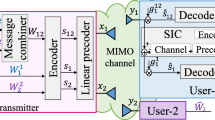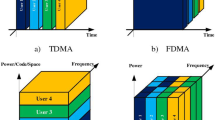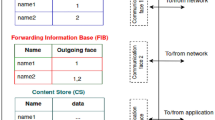Abstract
In this paper, we investigate the problem of optimal reliable relay selection in multiuser cooperative wireless networks in the presence of malicious relay nodes. A general discrete time queueing model for such networks is introduced which takes into account the dynamic variations of the channel state, the dynamic malicious behaviour of relay nodes as well as stochastic arrival of data packets into the system. The model consists of a set of mobile users, one destination node and a set of relay nodes which may be either mobile or fixed. The system uses the benefit of cooperative diversity by relaying in the decode and forward mode. We assume that each user either transmits its packets directly to the destination (direct mode) or transmits them with the cooperation of a selected relay node (cooperative mode). It is assumed that a centralized network controller manages the relay selection process in the system. At each time slot, a malicious relay node in the system may behave spitefully and refuse to cooperate with a user deliberately when it is selected to cooperate with that user. A malicious relay node usually acts stochastically to hide its malicious behaviour for longer time. In such a system, at each time slot the network controller should decide whether a user has to cooperate with any relay node or not and if so, which relay node must be selected for cooperation. First, we show that the malicious behaviour of relay nodes makes the stable throughput region shrink. Then, we propose a throughput optimal secure relay selection policy that can stabilize the system for all the arrival rate vectors strictly inside the network stability region. We show that the optimal policy is equivalent to finding the maximum weighted matching in a weighted bipartite graph at each time slot. Finally, we use simulations to compare the performance of the proposed policy with that of four other sub-optimal policies in terms of average queue occupancy (or queueing delay).











Similar content being viewed by others
Notes
The amount of incoming and outgoing traffic of a node should be the same.
The amount of outgoing traffic from a node cannot be grater than the maximum achievable rate.
References
Cover, T. M., & El Gamal, A. (1979). Capacity theorems for the relay channel. IEEE Transactions on Information Theory, 25(5), 572–584.
Sendonaris, A., Erkip, E., & Aazhang, B. (2003). User cooperation diversity Part I: System description. IEEE Transactions on Information Theory, 51(11), 1927–1938.
Kramer, G., Gastpar, M., & Gupta, P. (2005). Cooperative strategies and capacity theorems for relay networks. IEEE Transactions on Information Theory, 51(9), 3037–3063.
Laneman, N., Tse, D., & Wornell, G. (2004). Cooperative diversity in wireless networks: Efficient protocols and outage behavior. IEEE Transactions on Information Theory, 50(12), 3062–3080.
Kramer, G., Maric, I., & Yates, R. D. (2007). Cooperative communications. Hanover MA: Foundations and Trends in Networking, NOW Publishers.
Beres, E., & Adve, R. (2008). Selection cooperation in multi-source cooperative networks. IEEE Transactions on Wireless Communications, 7(1), 118–127.
Zhang, Y., Xu, Y., & Cai, Y. (2008, December). Relay selection utilizing power control for decode-and-forward wireless relay networks. In Proceedings of 2nd international conference on signal processing and communication systems, ICSPCS’08.
Jing, Y., & Jafarkhani, H. (2009). Single and multiple relay selection schemes and their achievable diversity orders. IEEE Transactions on Wireless Communications, 8(3), 1414–1423.
Wang, B., Han, Z., & Liu, K. J. R. (2009). Distributed relay selection and power control for multiuser cooperative communication networks using stackelberg game. IEEE Transactions on Mobile Computing, 8(7), 975–990.
Nam, S., Vu, M., & Tarokh, V. (2008, March). Relay selection methods for wireless cooperative communications. In Conference on information sciences and systems (CISS).
Ibrahim, A., Sadek, A. K., Su, W., & Liu, K. J. R. (2008). Cooperative communications with relay selection: When to cooperate and whom to cooperate with? IEEE Transactions on Wireless Communications, 7(7), 2814–2827.
Sadek, A. K., Han, Z., & Liu, K. J. R. (2006, April). An efficient cooperation protocol to extend coverage area in cellular networks. In Proceedings of IEEE wireless communications and networking conference.
Yeh, E., & Berry, R. (2007). Throughput optimal control of cooperative relaying networks. IEEE Transactions on Information Theory, special issue on "Models, theory and codes for relaying and cooperation in communication networks", 53(10), 3827–3833.
Wei, Y., Yu, F. R., Song, M., & Leung, V. C. M. (2009, December). Energy efficient distributed relay selection in wireless cooperative networks with finite state Markov channels. In Proceedings of IEEE Globecom’09.
Urgaonkar, R., & Neely, M. J. (2009, April). Delay-limited cooperative communication with reliability constraints in wireless networks. In Proceedings of IEEE INFOCOM 2009.
Halabian, H., Lambadaris, I., Lung, C.-H., & Srinivasan, A. (2010, November). Throughput-optimal relay selection in multiuser cooperative relaying networks. In Proceedings of IEEE Milcom’10.
Jiang, X., Lin, C., Yin, H., Chen, Z., & Su, L. (2009, January). Game-based trust establishment for mobile ad hoc networks. In Proceedings of WRI international conference on communications and mobile computing (CMC’09).
Shankaran, R., Varadharajan, V., Orgun, M. A., & Hitchens, M. (2009, July). Context-aware trust management for peer-to-peer mobile ad-hoc networks. In Proceedings of 33rd IEEE computer software and applications conference (COMPSAC’09).
Chang, B. J., & Kuo, S. L. (2009). Markov chain trust model for trust-value analysis and key management in distributed multicast MANETs. IEEE Transactions on Vehicular Technology, 58(4), 1846–1863.
Buchegger, S., & Boudec, J.-Y. L. (2004, June). A robust reputation system for P2P and mobile ad-hoc networks. In Proceedings of 2nd workshop on economics of peer-to-peer systems.
Zouridaki, C., Mark, B. L., Hejmo, M., & Thomas, R. K. (2005, November). A quantitative trust establishment framework for reliable data packet delivery in MANETs. In Proceedings of 3rd ACM workshop on security of Ad Hoc and sensor networks (SASN’05).
Dehnie, S., & Memon, N. (2008, April). A stochastic model for misbehaving relays in cooperative diversity. In Proceedings IEEE WCNC’08.
Davison, A. C. (2003). Statistical models. Cambridge: Cambridge University Press.
Berger, J. (1985). Statistical decision theory and Bayesian analysis. Berlin: Springer.
Han, Z., & Sun, Y. L. (2009). Distributed cooperative transmission with unreliable and untrustworthy relay channels. EURASIP Journal on Wireless Communications and Networking, special issue on Wireless Network Security. doi:10.1155/2009/740912.
Changiz, R., Halabian, H., Yu, F. R., Lambadaris, I., & Tang, H. (2010, December). Trust management in wireless mobile networks with cooperative communications. In Proceedings of IEEE/IFIP TrustCom’10.
Changiz, R., Halabian, H., Yu, F. R., Lambadaris, I., Tang, H., & Mason, P. C. (2010, November). Trust establishment in cooperative wireless networks. In Proceedings of IEEE Milcom’10.
Tassiulas, L., & Ephremides, A. (1992). Stability properties of constrained queueing systems and scheduling policies for maximum throughput in multihop radio networks. IEEE Transactions on Automatic Control, 37(12), 1936–1948.
Tassiulas, L., & Ephremides, A. (1993). Dynamic server allocation to parallel queues with randomly varying connectivity. IEEE Transactions on Information Theory, 39(2), 466–478.
Georgiadis, L., Neely, M. J., & Tassiulas, L. (2006). Resource allocation and cross layer control in wireless networks. Hanover MA: Now Publisher.
Neely, M. J. (2003). Dynamic power allocation and routing for satellite and wireless networks with time varying channels. Ph.D. dissertation, Massachusetts Institute of Technology, LIDS.
Cormen, T. H., Leiserson, C. E., Rivest, R. L., & Stein, C. (2001). Introduction to algorithms (2nd ed). Cambridge: MIT Press.
Kuhn, H. W. (1955). The Hungarian method for the assignment problem. Naval Research Logistic Quarterly, 2, 83–97.
Author information
Authors and Affiliations
Corresponding author
Rights and permissions
About this article
Cite this article
Halabian, H., Changiz, R., Yu, F.R. et al. Optimal reliable relay selection in multiuser cooperative relaying networks. Wireless Netw 18, 591–603 (2012). https://doi.org/10.1007/s11276-012-0421-8
Published:
Issue Date:
DOI: https://doi.org/10.1007/s11276-012-0421-8




